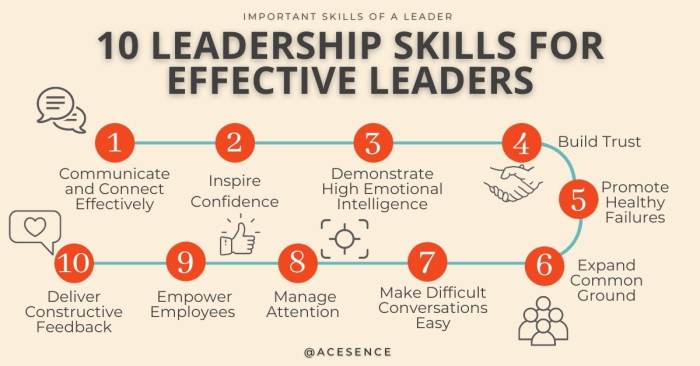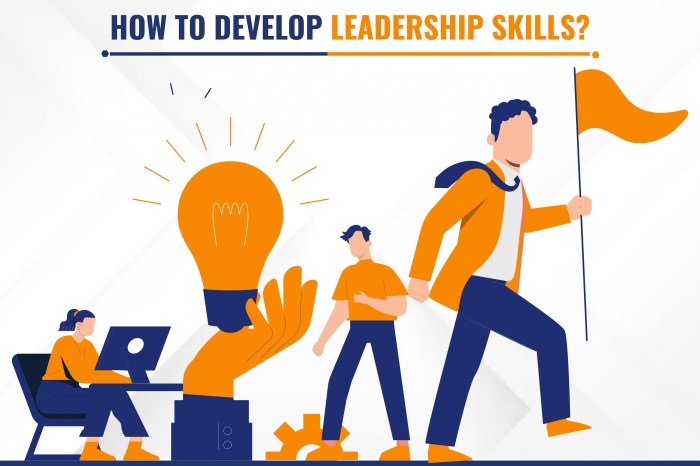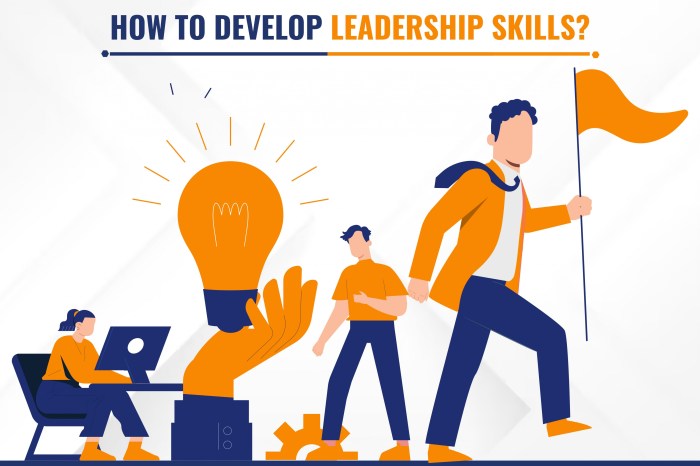Developing Leadership Skills sets the stage for personal growth and career success, exploring the essential qualities and strategies needed to thrive in various aspects of life. Dive into this journey towards becoming a well-rounded leader.
Importance of Developing Leadership Skills
Developing leadership skills is crucial in various aspects of life as it helps individuals become effective communicators, problem solvers, and decision-makers. These skills contribute to personal growth by boosting self-confidence, resilience, and the ability to inspire and motivate others. In terms of career advancement, leadership skills are highly sought after by employers as they demonstrate the potential to lead teams, drive innovation, and achieve organizational goals.
Examples of Successful Leaders
- Steve Jobs: The co-founder of Apple Inc. was known for his visionary leadership style, creativity, and ability to inspire employees to think outside the box.
- Oprah Winfrey: The media mogul and philanthropist exemplifies strong leadership through her authenticity, empathy, and dedication to making a positive impact on society.
- Elon Musk: The CEO of Tesla and SpaceX showcases leadership skills through his strategic thinking, risk-taking, and relentless pursuit of ambitious goals.
Key Leadership Skills to Develop

Developing key leadership skills is essential for becoming an effective leader in any situation. Here are some of the most important skills to focus on:
1. Communication
Effective communication is crucial for a leader to convey their ideas, goals, and expectations clearly to their team. This skill involves both listening and speaking, as well as the ability to adapt communication styles to different audiences.
2. Decision-Making
Strong decision-making skills are necessary for a leader to make tough choices quickly and efficiently. This involves gathering relevant information, analyzing potential outcomes, and confidently choosing the best course of action.
3. Emotional Intelligence
Emotional intelligence is the ability to understand and manage emotions, both in oneself and in others. Leaders with high emotional intelligence can build strong relationships, handle conflicts effectively, and inspire trust among their team members.
4. Leadership Styles
There are various leadership styles, including autocratic, democratic, transformational, and laissez-faire. Each style has its own strengths and weaknesses, and the effectiveness of a style depends on the situation and the team members involved.
5. Strategies for Improvement
To improve leadership skills, leaders can focus on practicing active listening, seeking feedback from team members, attending leadership development workshops, and studying successful leaders in their field. Continuous self-reflection and learning are key to becoming a well-rounded leader.
Ways to Develop Leadership Skills: Developing Leadership Skills

To become a successful leader, one must continuously work on developing and enhancing their leadership skills. Here are some practical ways to achieve this goal:
Mentorship and Coaching, Developing Leadership Skills
“A mentor is someone who allows you to see the hope inside yourself.” – Oprah Winfrey
- Seek out a mentor who can provide guidance, support, and valuable feedback on your leadership journey.
- Participate in coaching sessions to work on specific areas of improvement and receive personalized advice.
Continuous Learning and Self-Improvement
“Leadership and learning are indispensable to each other.” – John F. Kennedy
- Read books, attend workshops, and take courses to expand your knowledge and skills in leadership.
- Reflect on your experiences, learn from failures, and constantly strive to grow and evolve as a leader.
Practice Leadership Skills in Everyday Situations
“Leadership is not a position or a title, it is action and example.” – Cory Booker
- Take on leadership roles in group projects or volunteer activities to practice decision-making, communication, and problem-solving.
- Lead by example, motivate others, and demonstrate empathy and understanding in interactions with peers and colleagues.
Challenges in Developing Leadership Skills
Developing leadership skills can be a daunting task, as individuals often face various challenges along the way. These obstacles can hinder personal growth and hinder the ability to lead effectively.
Time Management
One common challenge in developing leadership skills is time management. Balancing work, personal life, and skill development can be overwhelming. To overcome this challenge, individuals can create a detailed schedule, prioritize tasks, and delegate responsibilities when necessary.
Communication Skills
Another challenge is improving communication skills. Effective communication is crucial for successful leadership. To enhance communication abilities, individuals can practice active listening, seek feedback, and participate in workshops or courses focused on communication.
Decision-Making
Decision-making is a key aspect of leadership, but it can be challenging to make tough decisions. To overcome this obstacle, individuals can gather relevant information, consult with mentors or peers, and practice making decisions in various scenarios.
Conflict Resolution
Dealing with conflicts within a team or organization is another challenge leaders face. To navigate through conflicts effectively, individuals can learn conflict resolution strategies, remain neutral, and encourage open communication among team members.
Adaptability
Lastly, adaptability is crucial for effective leadership, but it can be difficult to adapt to changing circumstances. To enhance adaptability, individuals can embrace change, stay open-minded, and continuously seek opportunities for growth and learning.
